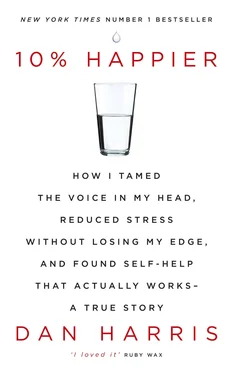Very quickly, my strategy—or lack thereof—began to backfire. When massive street protests flared up in Egypt against the dictator Hosni Mubarak, Ben flooded the zone with ABC News staffers. This was history in the making—the kind of thing I lived for. In the past, it was exactly the type of story for which I’d been first out the door, but this time I did not get the call. Instead, I watched from the discomfort of my living room couch as Terry Moran and David Muir, among others, covered the story. The old me might have made an impulsive phone call or two. But the new, metta-meditating me thought that approach, which involved making my case to the detriment of my peers, uncompassionate.
As I pondered this dilemma, the situation at work only got worse. When a real, not figurative, earthquake and tsunami hit Japan, Ben sent David and Bill Weir over to cover it. At home on the couch with Bianca, we watched the horror play out on-screen. The images were overwhelming. My wife was in a puddle of tears, while the freshly minted brown belt in loving-kindness was feeling badly both for the victims—and himself.
Not long after Ben’s arrival, I reluctantly went up to snowy central Massachusetts for a metta meditation retreat. Sharon Salzberg, an old-school Jew-Bu and new friend of mine, had invited me up several months before. It was a nice gesture, and I had accepted the invitation, but given recent developments at the office, I just wasn’t in the mood for it. Even so, I drove the four hours to endure three days of straining to generate good vibes.
The setting was nice, at least. Sharon, Joseph, and another teacher named Jack Kornfield had founded the Insight Meditation Society (also known by regulars as IMS or, sometimes, “I’m a mess”) back in 1976. They’d scraped together $150,000 for a down payment on a multiwing, one-hundred-room redbrick mansion that had most recently served as a Catholic monastery. They had converted the chapel into a meditation hall, although they’d left up the stained glass images of Jesus. The rest of the building was decorated with potted plants, large geodes, and ancient Buddhist artifacts, which reminded me of the living rooms of my childhood friends with progressive parents.
Sharon happened to give a very timely talk on the subject of mudita, the Buddhist term for sympathetic joy. She admitted that sometimes her first instinct when trying to summon this feeling was “Ew, I wish you didn’t have so much going for you.” The meditation hall erupted in laughter. Sharon said the biggest obstacle to mudita is a subconscious illusion, that whatever success the other person has achieved was actually somehow really meant for us. “It’s almost like, it was heading right for me,” she said, “and you just reached out and grabbed it.” More laughter, as everyone in the room enjoyed one of the most satisfying of all dharma delicacies: an accurate diagnosis of our inner lunacy.
On the second day, I spotted a little note with my name on it posted to the message board in the main hallway. Sharon would see me that afternoon. As I padded into her interview room, she gave me a big hug. She was a jolly woman in her late fifties who, like pretty much every long-term meditator I knew, looked significantly younger than her chronological age. As we chatted, I mentioned that I was somewhat preoccupied by things at work; I described my concern that I’d suddenly become more of a bench-warmer.
“When faced with something like this,” she said, “often it’s not the unknown that scares us, it’s that we think we know what’s going to happen—and that it’s going to be bad. But the truth is, we really don’t know.”
The smart play, she said, was to turn the situation to my internal advantage. “Fear of annihilation,” she said, “can lead to great insight, because it reminds us of impermanence and the fact that we are not in control.”
This got me thinking again about the “wisdom of insecurity.” From the comfort and remove of the sylvan idyll of IMS, it hit me afresh that the “security” for which I had been striving was an illusion. If everything in this world was in constant decay, why expend so much energy gnashing my teeth over work?
I began to examine the source of my drive. Was it rooted in my privileged upbringing? Maybe this is just what “people like me” did? Was it because I grew up in a town crawling with rich kids whose parents drove Porsches and BMWs, while my folks—academic physicians, not bankers—drove a shit-brown Plymouth Valiant and a gray Chevy Chevette? Much of my adolescence was characterized by a self-imposed feeling of lack. Now that I was a “spiritual” guy, maybe it was time to transcend my bourgeois conditioning?
I snapped out of it quickly enough. The Buddha never said it was un-kosher to strive. Right there on his Noble Eightfold Path, his list of the eight things you had to do to get enlightened, “Right Livelihood” was number five. He was proud of everything he built, including his ranks of monks and nuns. He wasn’t particularly modest, either. This was a man who regularly referred to himself in the third person.
Here I was, two and a half years after I’d first discovered Eckhart Tolle, still wrestling with the same question: Was it possible to strike a balance between “the price of security” and the “wisdom of insecurity”?
Back at the office, what I viewed as a downward spiral only continued. 2011 was a huge news year: the death of Osama bin Laden, the fall of Qaddafi in Libya, the Royal Wedding of William and Kate, and I didn’t get tagged to cover any of it. (That last one fell into the didn’t-want-to-do-it-but-would-have-liked-to-have-been-asked category, but still . . .)
At times, I managed to convince myself I was handling it pretty well. When I got into a rut, it didn’t take long for me to jar myself out of it. I would use RAIN—watching how the feelings would show themselves in my body and then labeling them with some degree of nonjudgmental remove. It reminded me of how soldiers and police officers I’d interviewed described their reactions in emergency situations. They would almost always say something to the effect of “My training kicked in.”
I also thought, with a degree of self-satisfaction, that having a calmer, more compassionate mind was allowing me to take a dry-eyed view of the situation, unclouded by unhelpful emotion. Rather than take it personally, I tried to see it through Ben’s eyes. He was just doing the best he could to turn the news division around. Maybe I just wasn’t his cup of tea? I comforted myself with the conclusion that I was engaged in a healthy acknowledgment of reality that would ultimately allow for the virtuous cycle of less unnecessary straining and better decision making.
My loving wife, however, thought I was being a total wuss. While she was glad I wasn’t losing my cool, she was bewildered by the fact that her husband seemed so suddenly gelded. When a big story broke, she and I would often have text exchanges in which Bianca would urge me to advocate for myself. For example:
Me: “I feel I still don’t have a good approach yet to asserting myself in these situations w/o reverting to my old dickish ways.”
Bianca: “I understand. But you’re not going to risk anything by being slightly more aggressive about it instead of a passively available team player.”
I knew she wasn’t trying to criticize, but I could feel defensiveness welling up anyway. I struggled not to misdirect my frustration at the one person who was trying to help me. All I wanted to do was bury my head and hope the situation went away. I just couldn’t figure out the right play.
By now, the nice emails from Ben had stopped—because I wasn’t doing anything to deserve them. Not only was I not getting tapped to cover the big stories, but I’d somehow lost my motivation to pitch and produce special investigative reports, my longtime specialty. I’d hear Ben praising people on the morning call, summoning rounds of applause from the attendees, and I wanted to do work that merited this reaction. And yet the more discouraged I got, the more trouble I had overcoming inertia.
Читать дальше












